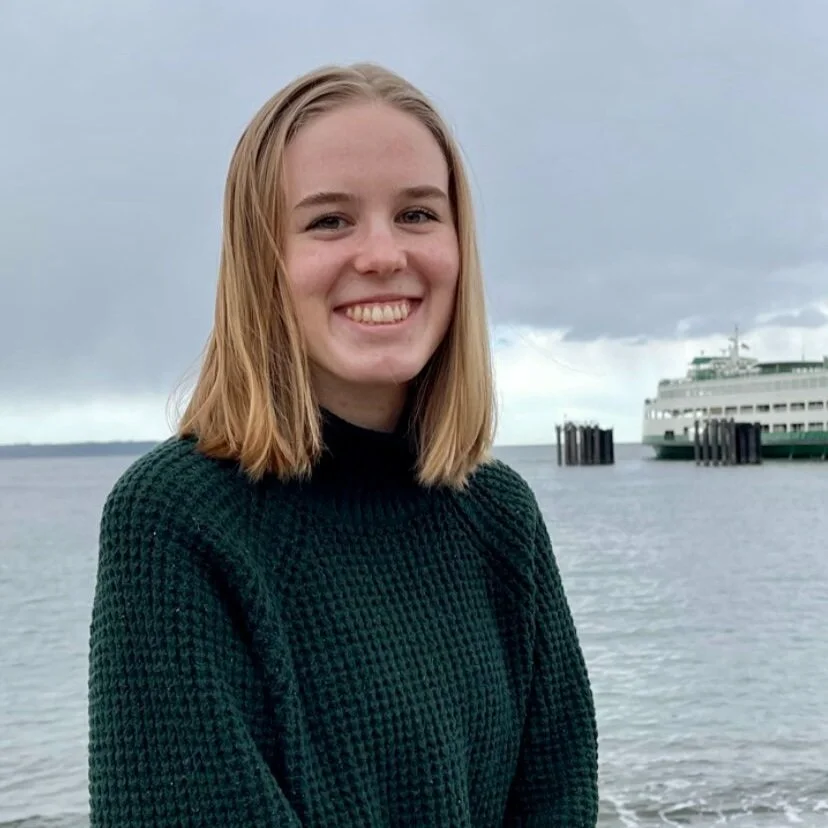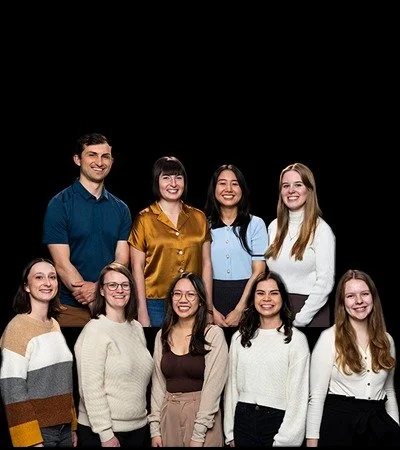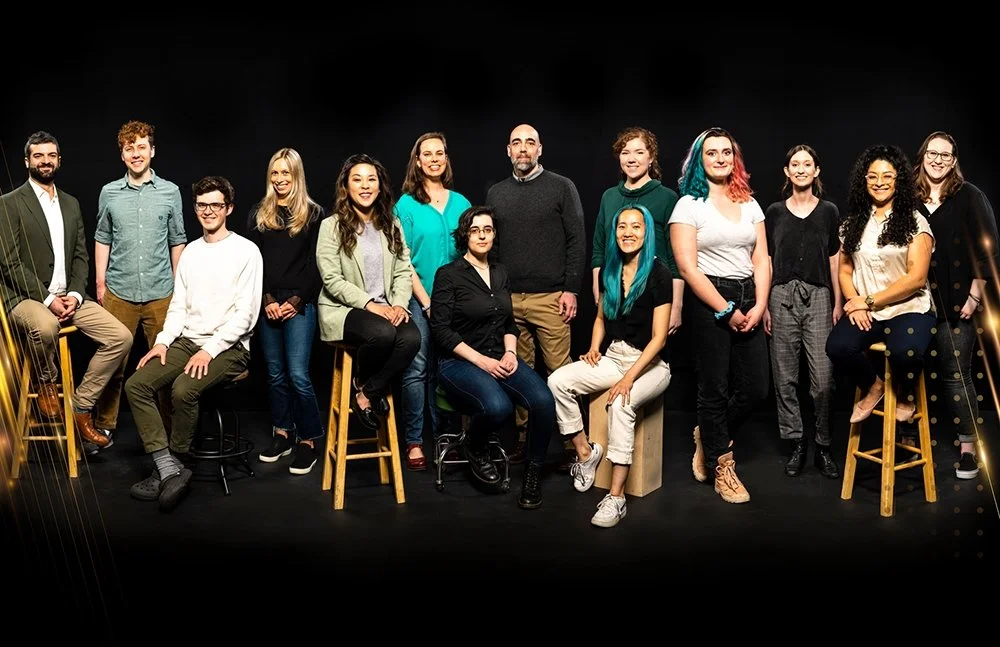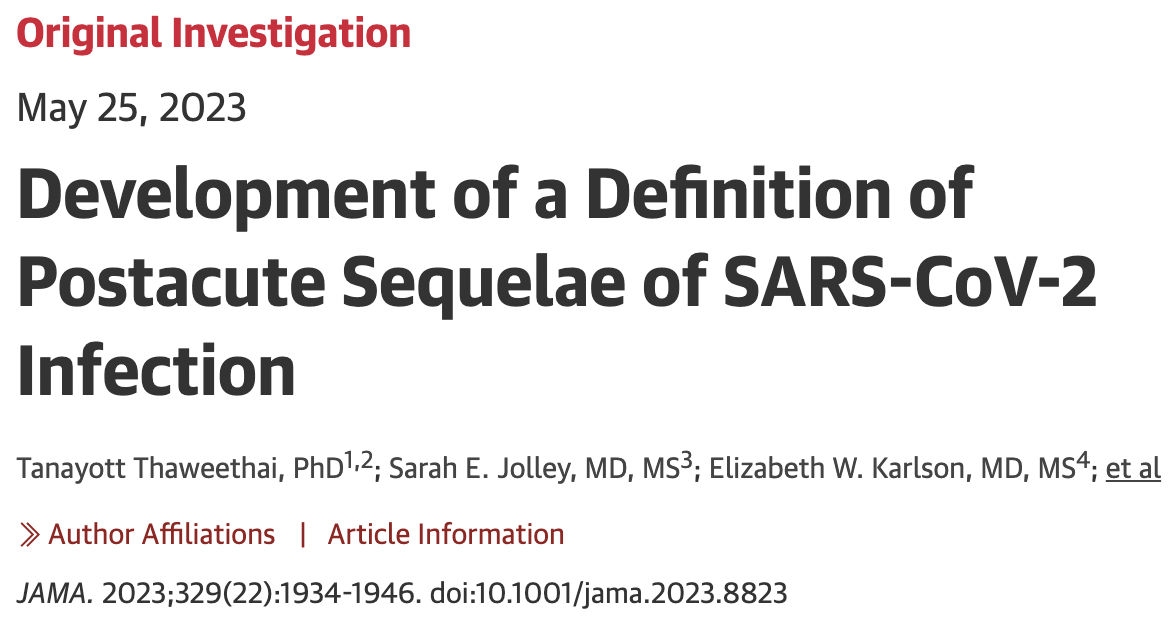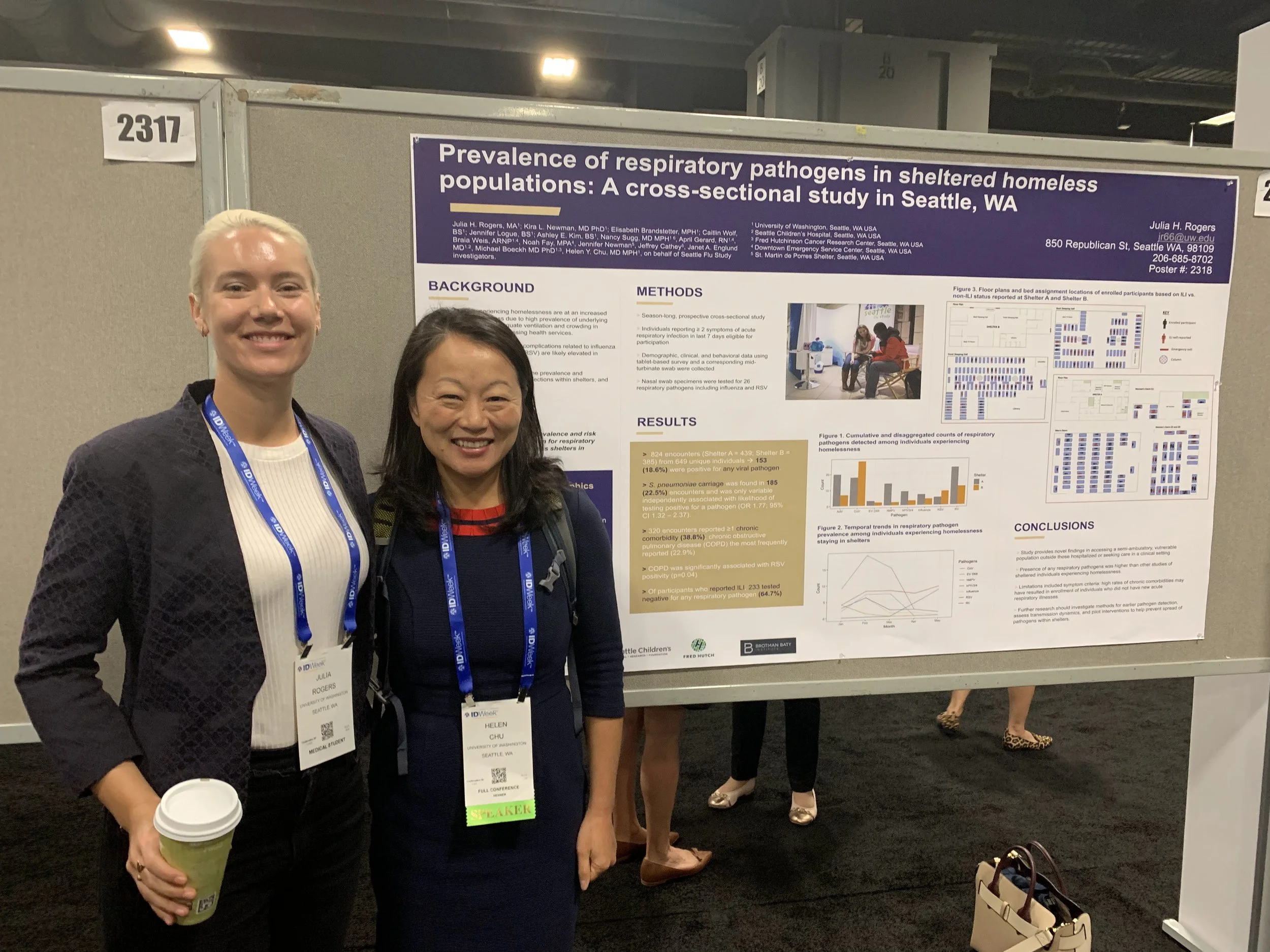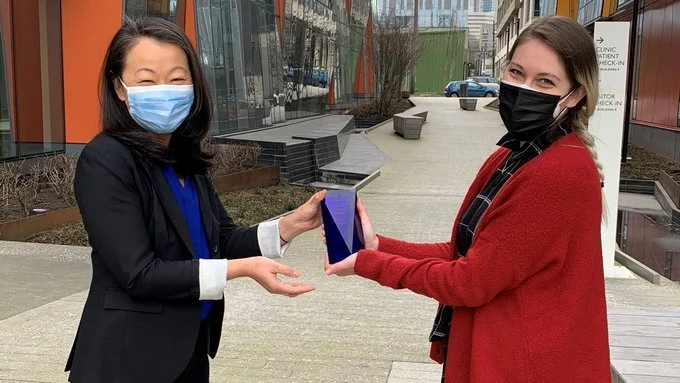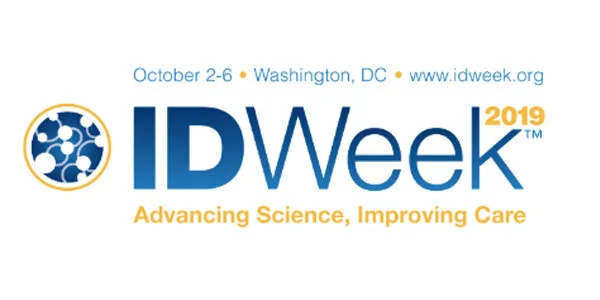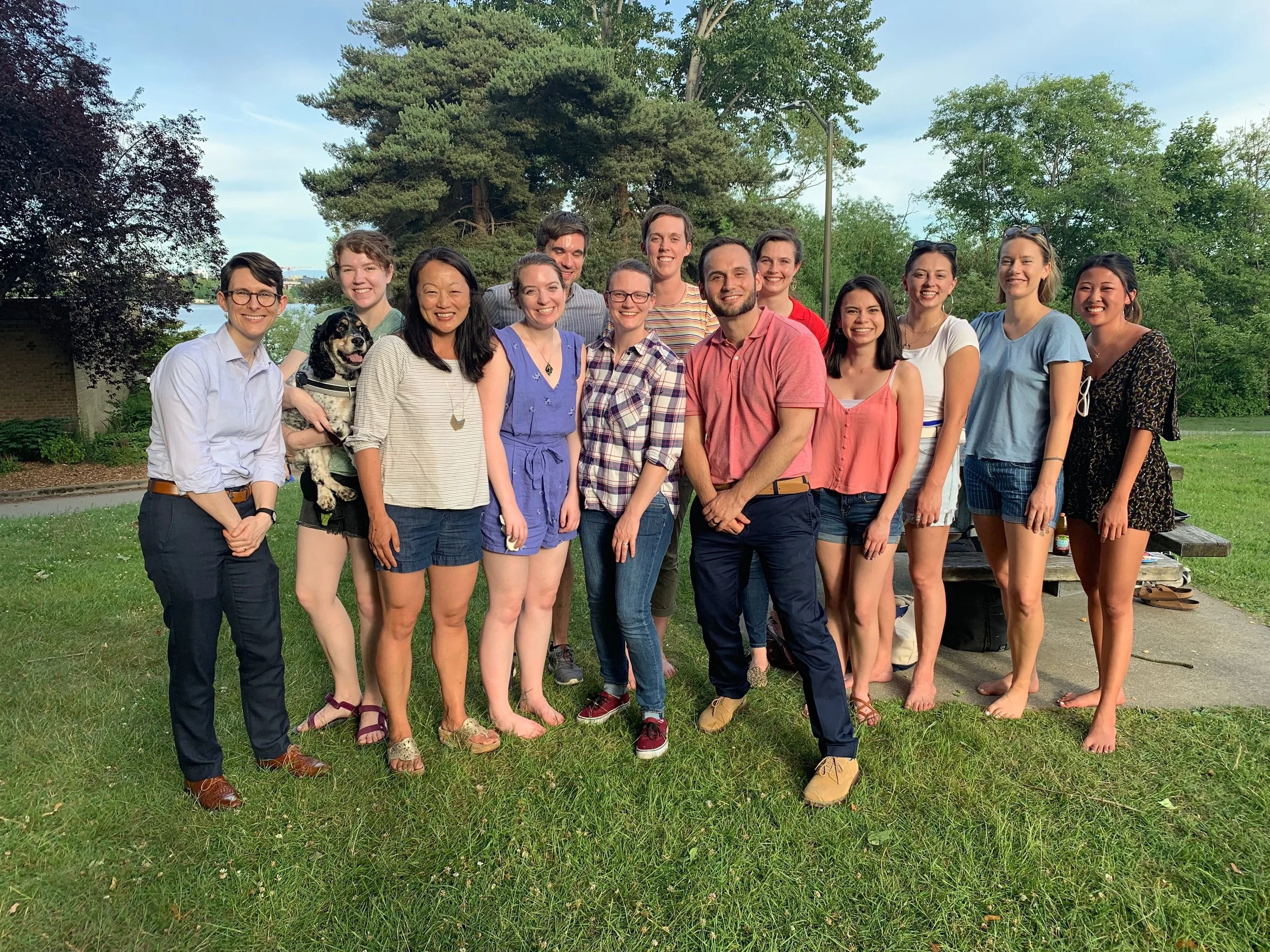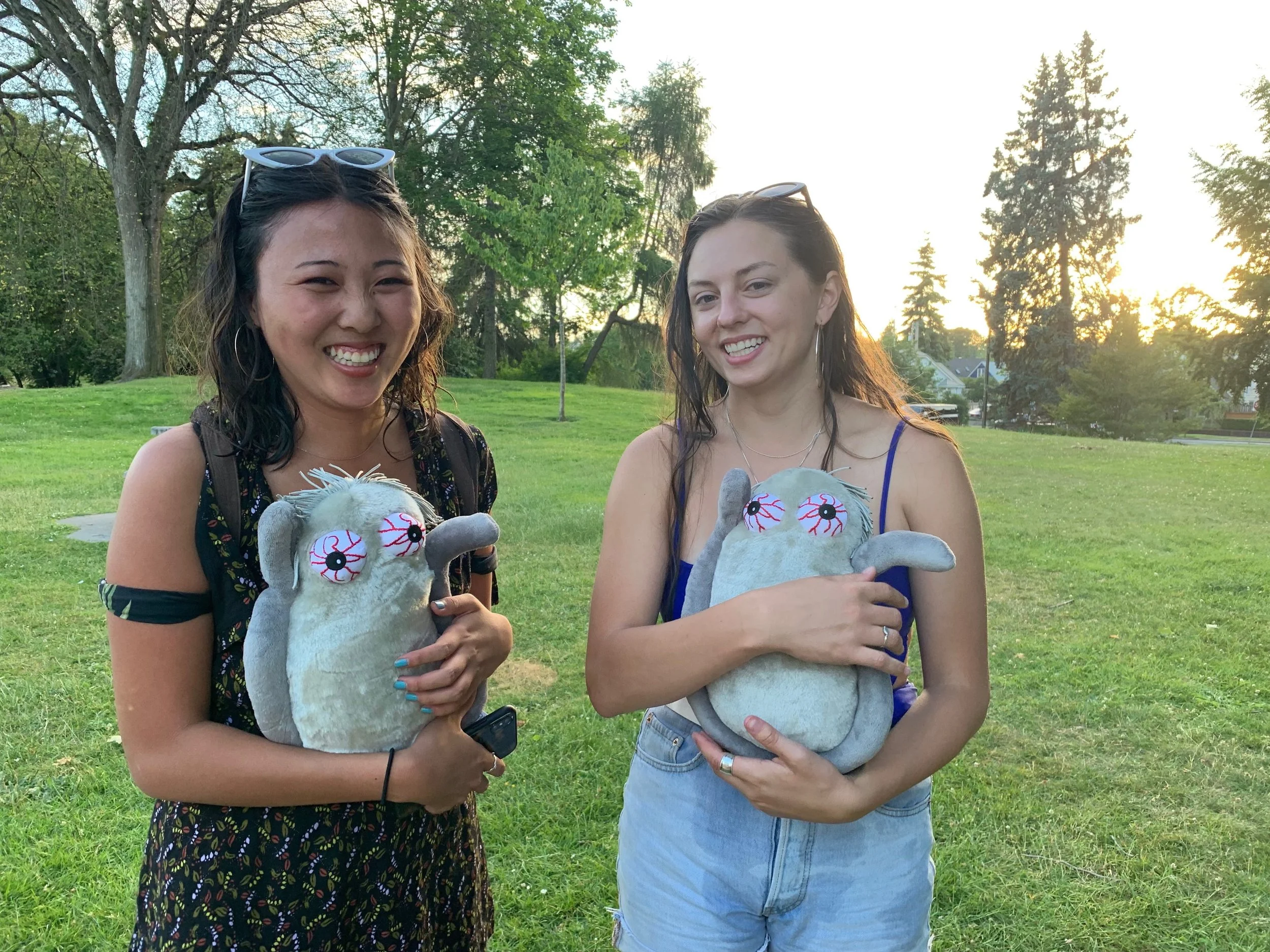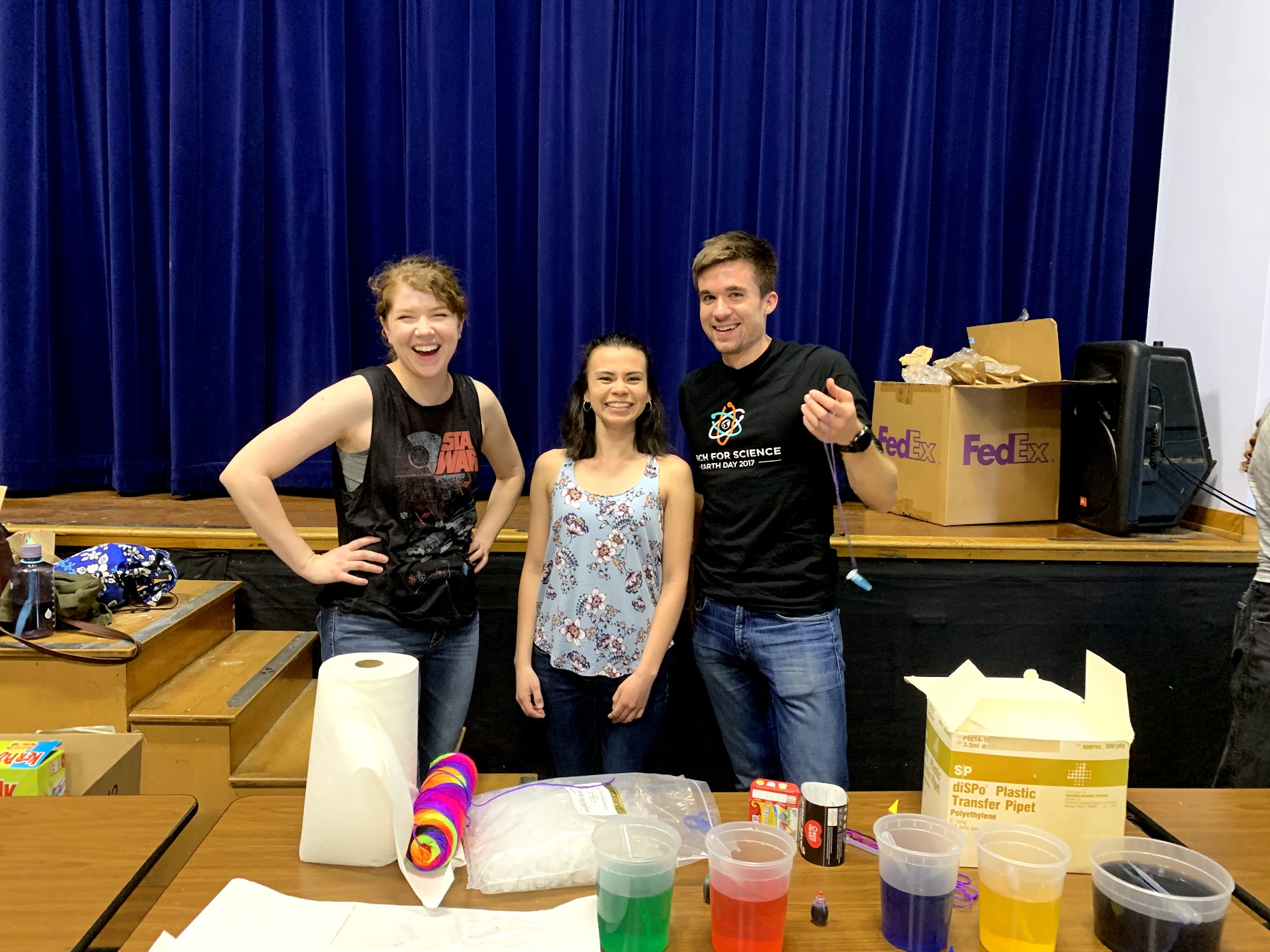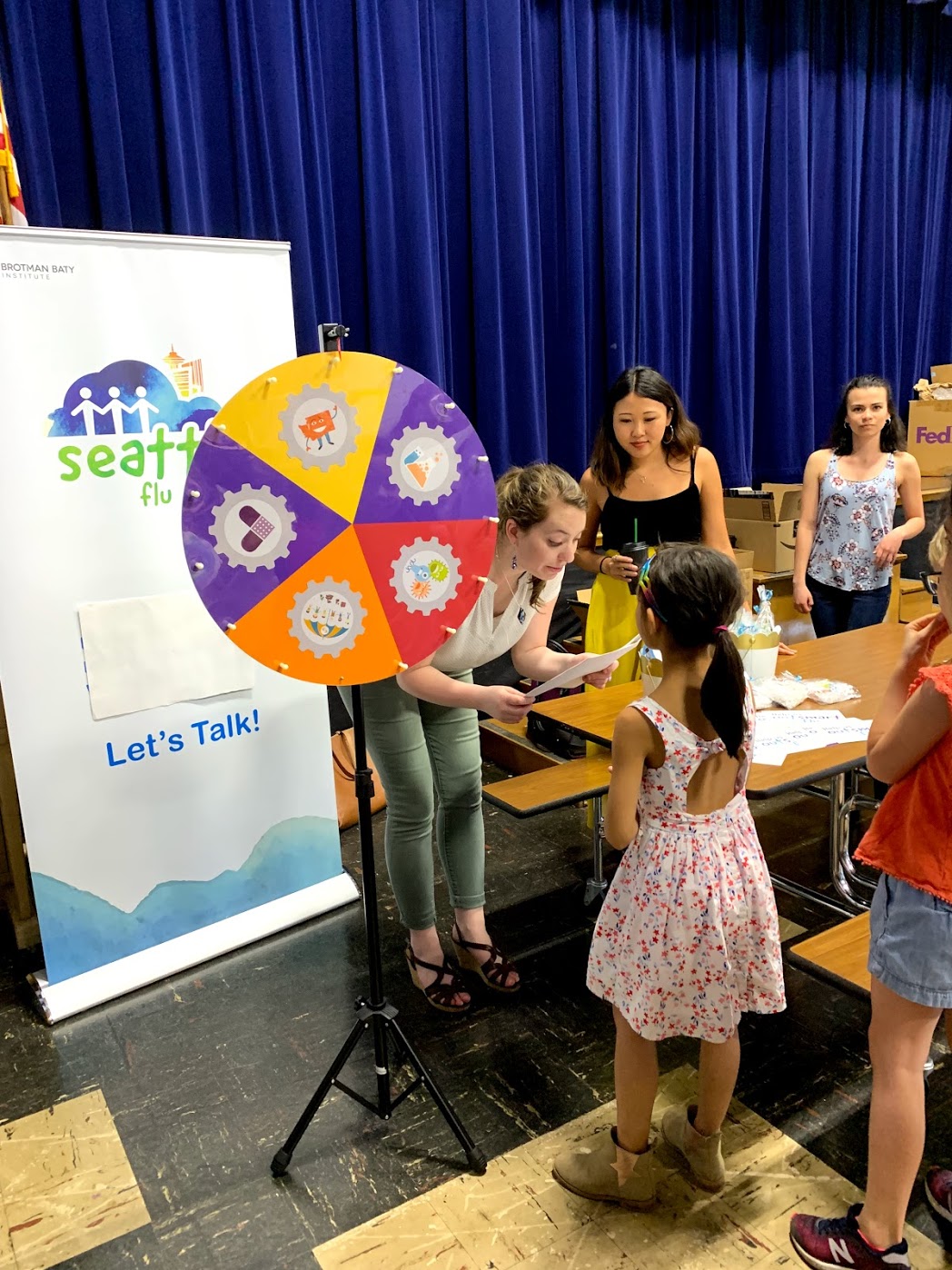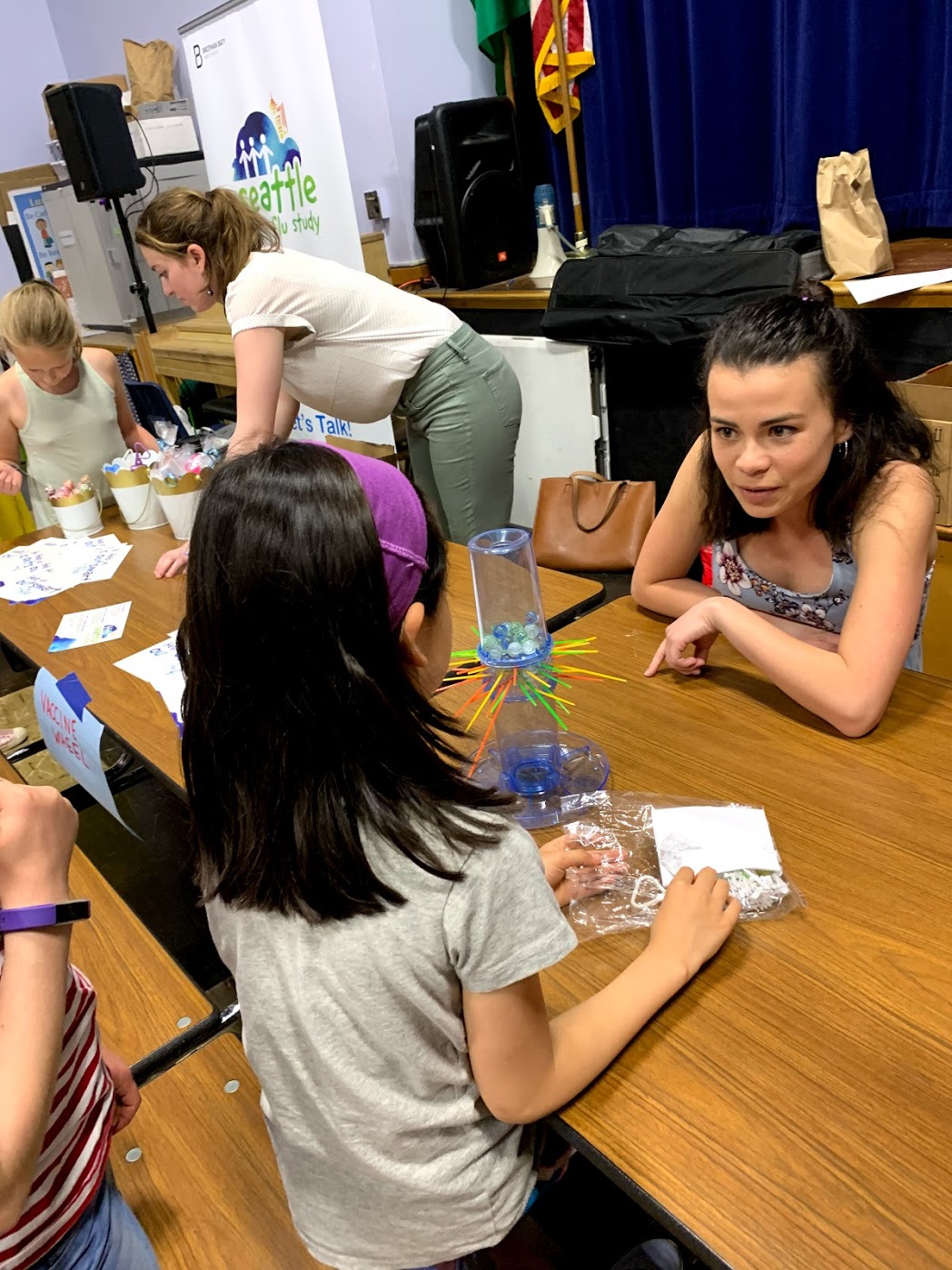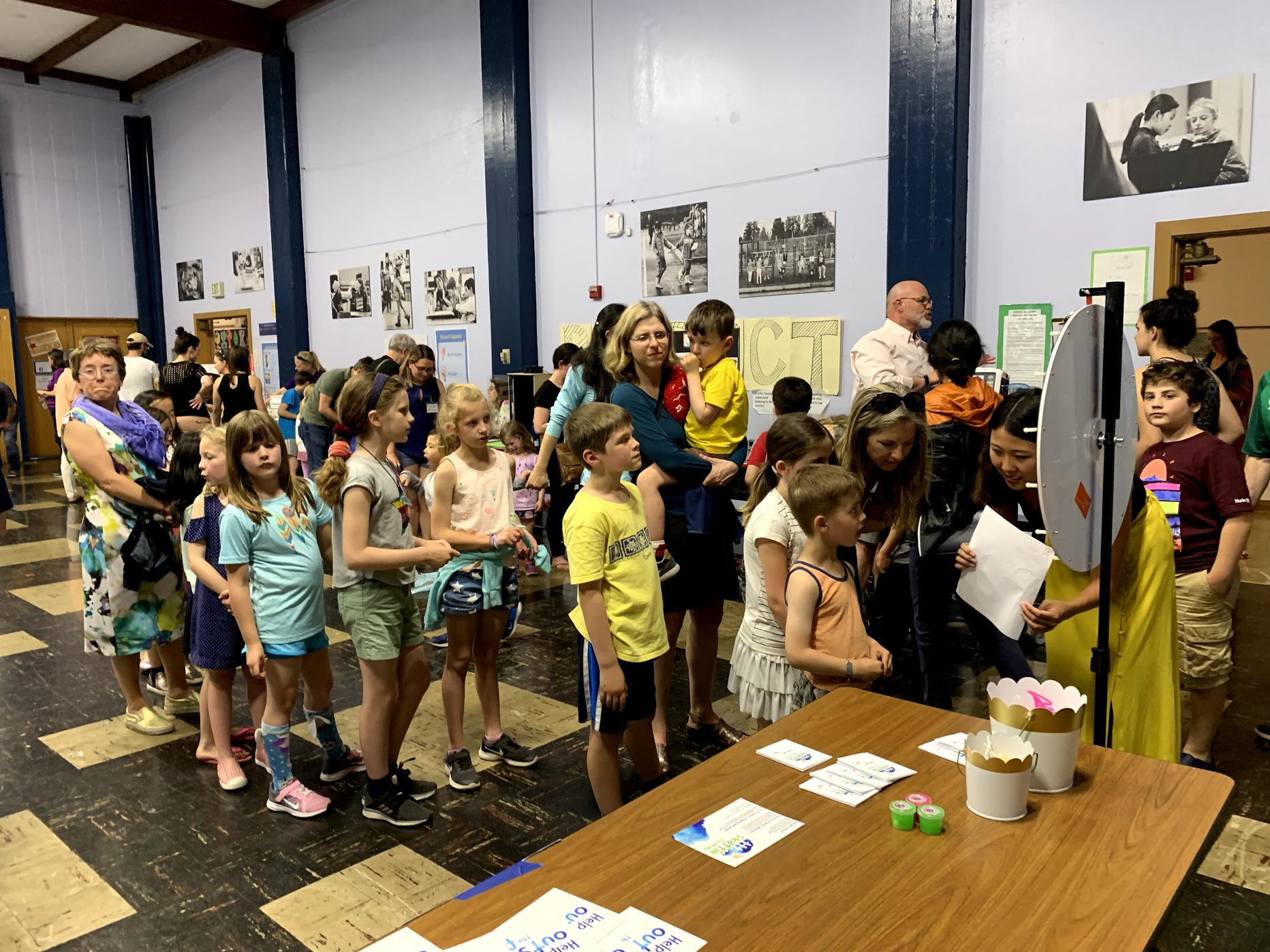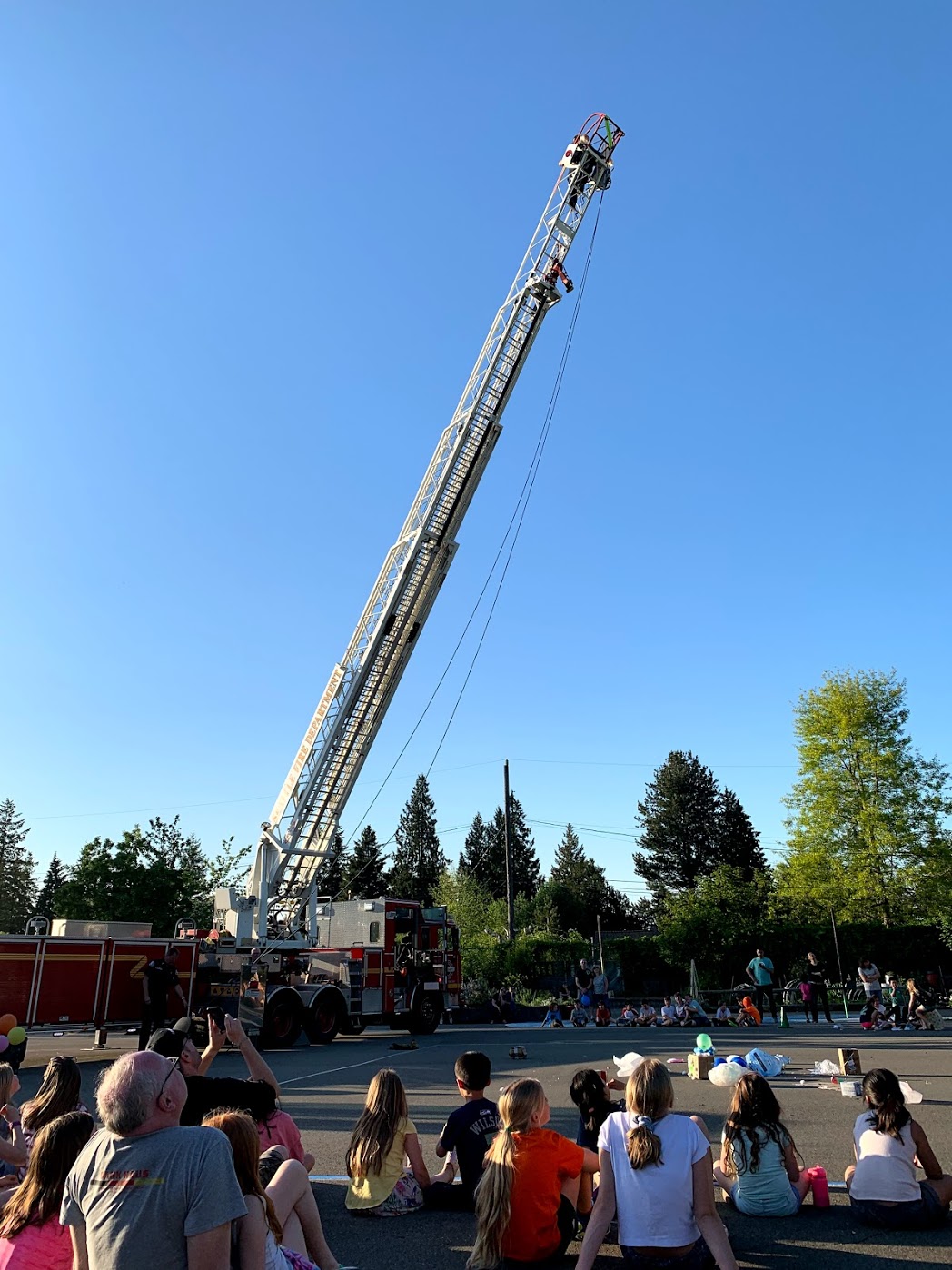Lab News
July 2024
Dr. Helen Chu elected to CDC Advisory Committee on Immunization Practices
Congratulations to Dr. Helen Chu! Dr. Chu, professor of medicine and epidemiology (Allergy and Infectious Diseases), has been elected to the U.S. Centers for Disease Control and Prevention’s (CDC) Advisory Committee on Immunization Practices.
The advisory committee develops recommendations for U.S. immunizations, including ages when vaccines should be given, number of doses, time between doses, and precautions and contraindications.
Dr. Chu will serve a four-year term from July 2024 - June 2028. Once again, congratulations Dr. Chu!
June 8, 2024
Anna Elias-Warren, Lindsay Engelbert, & Rino Watanabe graduate!
Congratulations to Anna Elias-Warren, Lindsay Engelbert, and Rino Watanabe for graduating! Anna Elias-Warren completed her MPH in Epidemiology; Lindsay Engelbert completed her B.S. in Biology, Physiology and minor in nutrition; and Rino Watanabe completed her B.S. in Molecular, Cellular, Developmental Biology with Interdisciplinary Honors. Once again, congratulations Anna, Lindsay, and Rino!
June 8, 2024
Sarah Cox Kraus graduates!
Congratulations to Sarah Cox Kraus for completing her PhD in Epidemiology! Sarah has led research on respiratory viruses and vaccines in two large studies among people experiencing homelessness (Seattle Flu Study) and families (CASCADIA) in Seattle King County. Her commendable persistence and independence have enabled her to work closely with local shelters and the community to recruit participants, collect & analyze data, and share findings. Despite facing obstacles in these studies, Sarah has made the best of all situations while maintaining her positive attitude. Thanks to her relentless hard work, Sarah has published more than 20 peer-reviewed articles (6 as first-author) during her 3 years as a PhD student. Post-graduation, Sarah will continue to work as a consultant for the Chu Lab, designing and leading epidemiologic analyses. Once again, congratulations Sarah for this tremendous milestone!
June 6, 2024
HAARVI team receives UW’s 2024 Distinguished Staff Award for Impact
Top row: Nicholas M. Franko, Ariana Magedson, Kino Watanabe, Anna Elias-Warren
Bottom row: Dylan McDonald, Kristen Huden, Helen Nguyen, Jennifer Logue, Megan Kemp
Congratulations to the HAARVI team for receiving the 2024 UW Distinguished Staff Award in the Impact category! Over the past four years, the Hospitalized or Ambulatory Adults with Respiratory Viral Infections, or HAARVI, study has enrolled individuals recovered from SARS-CoV-2 infection into a prospective cohort study, including the first U.S. COVID-19 patient. The clinical samples from this cohort has been used by multiple studies investigating human immunology and virology, contributing to our understanding of durability of immunity and ability to evade novel variants.
Thanks to the dedicated work of the HAARVI team, the enrolled adult cohort, and our multiple ongoing collaborators, the resulting studies have had a pivotal impact in answering virologic and immunologic questions around hybrid immunity, vaccine breakthrough, variant response, and predictors of long COVID. Once again, congratulations to the HAARVI team for this tremendous feat!
Read more about the work of the HAARVI team on our website page (HAARVI Study).
March 2024
Julia Bennett graduates!
Congratulations to Julia Bennett for completing her PhD in Epidemiology! In her time at the Chu lab, Julia has worked on a variety of studies, including Husky Coronavirus Testing, Seattle Flu Study, and CASCADIA. She led several projects related to the surveillance of SARS-CoV-2, RSV, and influenza, making pivotal contributions to our knowledge of infectious diseases and vaccine effectiveness. Through her dedication and persistence in these projects, Julia has published 10 papers (4 as first author). Julia also received the 2023 UW Distinguished Staff Award for Innovation as a part of the Husky Coronavirus Testing Team. After graduation, Julia will be a CDC EIS (epidemic intelligence service) officer based at the WA Department of Health. Once again, congratulations Julia for all your accomplishments!
February 1, 2024
UW SOM and Seattle Flu Alliance’s 2024 Long COVID Symposium on February 1st
Curious about the differences between Long COVID and chronic infections? The Seattle Flu Alliance is hosting a Long-COVID Symposium on February 1st, exploring research and clinical aspects of the disease. The event will begin at 4 P.M. in the Foege Building on the UW campus and will be followed at 5:30 P.M. with a reception. BBI’s Dr. Helen Chu, professor of medicine at the UW, will moderate. Doors will open at 3:30 P.M.
“Our symposium brings together experts with a wide range of perspectives on the effects of Long-COVID from hospitals, UW Medicine, and public health agencies,” said Dr. Chu. “This event will be as enlightening as it will be engaging. I encourage researchers and healthcare professionals to attend.”
There is no charge; registration is now open (until 12 P.M. PST on January 26) to the public through the BBI website: https://brotmanbaty.org/events/2024-long-covid-symposium. Please send any questions to bb-events@uw.edu.
January 17, 2024
Collrane Frivold receives the NIH’s Ruth L. Kirschstein National Research Service Award (NRSA) Individual Predoctoral Fellowship (F31) award
Congratulations to Collrane Frivold for recently receiving the Ruth L. Kirschstein National Research Service Award (NRSA) Individual Predoctoral Fellowship (F31) award from the NIH! Collrane is a PhD Candidate in the Chu Lab, whose research will focus on evaluating the potential impact of maternal influenza vaccination in Nepal. Leveraging data from a maternal influenza vaccine randomized-controlled trial that the Chu Lab was previously involved with, this project seeks to close gaps in knowledge in low- and middle-income countries (LMICs) pertaining to maternal influenza disease severity, the impact of maternal influenza vaccination on infant growth, the optimal timing of vaccination during pregnancy, and the cost-effectiveness of this intervention. Data generated from this F31 project will expand the current maternal influenza vaccine evidence base in LMICs, which may motivate changes in vaccine policy, implementation, and investment decisions. Once again, congratulations Collrane on this well-deserved award!
January 4, 2024
Dr. Helen Chu talks about circulating viruses this winter season on KUOW
New year, same viruses. In an interview with KUOW’s Seattle Now (The viruses are back), Dr. Helen Chu explains what viruses are circulating and how to protect yourself. Specifically, Dr. Chu highlights 3 viruses – COVID, flu, and RSV – circulating this winter season. While flu and COVID cases are on the rise and predicted to continue increasing these next few weeks, RSV cases are steadily declining. Despite effective vaccines being available, vaccination levels for COVID, flu, and RSV in King County are relatively low. In light of this, Dr. Chu underscores the role of vaccine fatigue in deterring people from getting vaccinated. As we return to work and school, however, she encourages us to get those seasonal vaccines and protect ourselves before numbers spike!
Listen to the full conversation at Seattle Now.
May 29, 2023
Husky Coronavirus Testing (HCT) team receives UW’s 2023 Distinguished Staff Award for Innovation
Congratulations to the Husky Coronavirus Testing (HCT) team for receiving the 2023 UW Distinguished Staff Award in the Innovation category! In the summer of 2020, a team of BBI faculty members, including Drs. Helen Chu, Jay Shendure, Lea Starita, and Ana Weil, recognized the urgent need for accessible COVID-19 testing at the University of Washington. They collaborated with campus leadership and various laboratory, clinical, and administrative staff, launching the HCT program across all three UW campuses in September 2020.
Since 2020, HCT has played an integral role in the UW’s COVID-19 Prevention Plan, providing rapid and reliable “walk-in” and take-home PCR tests, as well as distributing UW-provided rapid antigen self-test kits. With the work of over 200 team members, the program enrolled over 40,000 participants and tested over 234,000 swabs for SARS-CoV-2. Over three years, the study identified tens of thousands of UW students, staff, and faculty who tested positive for the virus and its variants, allowing infected individuals (particularly asymptomatic individuals) to stay isolated and prevent further spread. Thanks to the HCT team’s innovative approach, the program dramatically mitigated the transmission and effects of COVID-19 on the UW community and greatly contributed to knowledge of the pandemic. Once again, congratulations to the HCT team for this amazing feat!
Read more about the work of the HCT study on our website page (Husky Coronavirus Testing).
May 24, 2023
RECOVER study reveals most common symptoms among long COVID-19 patients
A study of nearly 10,000 participants was published in the journal JAMA that highlights 12 out of more than 200 symptoms most commonly observed in long COVID-19 patients. The study also found that long COVID symptoms were more prevalent and severe among unvaccinated individuals and those who had multiple infections or had their first infection before the 2021 Omicron variant surged. These results mark one critical step towards demystifying the long-term consequences of long COVID for millions of individuals.
This study is one part of the NIH’s nationwide research initiative, Researching COVID to Enhance Recovery (RECOVER), which aims to understand, prevent, and treat long COVID. Dr. Helen Chu, who is the principal site investigator for the RECOVER study at the University of Washington School of Medicine, believes that this study’s results could be used in future studies investigating potential prevention and treatment interventions for long COVID. The UW School of Medicine is a member of the Pacific Northwest RECOVER consortium.
Read more about the exciting study from the UW Medicine Newsroom.
March 7, 2023
Julia Rogers Graduates
Congratulations to Julia Rogers on completing her PhD in epidemiology! Julia's hard work and dedication to her research in underserved communities and persons experiencing homelessness have paid off, and she should be incredibly proud of this remarkable achievement. Her contributions to the field of epidemiology are inspiring, and her passion for making a difference in the world is evident in her work. We look forward to seeing all the amazing things that Julia will continue to achieve in the future, and we know that her research will have a positive impact on countless lives. Once again, congratulations to Julia on this well-deserved accomplishment!
June 9, 2022
CASCADIA study launch
The University of Washington School of Medicine and Kaiser Permanente Center for Health Research will enroll 3,500 children and adults to participate in a study that assesses the effectiveness of COVID-19 vaccines in the community. The CASCADIA study will evaluate infections among all participants, young and old, vaccinated and unvaccinated, and the role that viral variants play in infection. The primary goal is to assess how well COVID-19 vaccines protect children ages 5 to 18 years. The study, funded by the CDC, will follow vaccinated and unvaccinated participants for up to four years for SARS-CoV-2 infection and other respiratory infections.
In the study, weekly at-home nasal swab tests will be used to test for SARS-CoV-2 infection, and participants will complete weekly symptom surveys online or over the phone. Blood samples to test for SARS-CoV-2 antibodies will be collected at the beginning of the study, annually, and after vaccination and infection. Researchers will sequence the genome of viruses they isolate to see whether there are genetic differences between the variants that cause infections in unvaccinated participants, breakthrough infections in the vaccinated, and reinfections in the previously infected.
Read more about the CASCADIA study from the Seattle Times and UW Newsroom.
April 10, 2022
RECOVER study launch
A new study seeking to understand the condition commonly known as "long COVID" is seeking volunteers from the Pacific Northwest region of the United States. More than 70% of people who contract COVID-19 continue to have lingering symptoms long after their acute illness has abated, but little is known about the condition. Common symptoms include the inability to exercise, headaches, fatigue, “brain fog,” shortness of breath, anxiety, depression, fever, chronic cough, and sleep problems. More severe complications of COVID-19 infections include stroke, heart inflammation, kidney failure, and lung fibrosis. The study is part of a national initiative called RECOVER (REsearching COVID to Enhance Recovery), which is funded by the National Institutes of Health. Researchers aim to enroll 900 adults age 18 and older who had COVID-19 or suspect that they had the infection, as well as people who have not been infected.
The Pacific Northwest RECOVER consortium, led by Seattle’s Institute for Systems Biology, will gather clinical information about participants’ general health, risk factors, and their long COVID symptoms, and conduct tests to assess things such as immune, heart, lung, and other organ function as they track the participants’ recoveries. All told, 30 research teams across the country are involved in the effort. Dr. Helen Chu, associate professor of medicine and the study's chief investigator from the University of Washington School of Medicine, said, "Starting from early in the pandemic, we observed how persistent symptoms have continued to affect peoples’ lives long after their initial illness. We are looking forward to participating in this study with all our local partners, and we’re particularly interested in enrolling patients from our underserved communities."
Read more about the RECOVER study from the Seattle Times and UW Newsroom.
January 10, 2022
Veesler Lab publication utilizing the HAARVI cohort
A study conducted by the University of Washington has found that individuals who have had one or two exposures to the spike protein of SARS-CoV-2 have weaker neutralising antibody responses than those who have had three or four exposures, either through infection or vaccination. Their serum binding and antibody neutralizing responses to the spike protein in current pandemic coronavirus variants were much more potent and lasting than those generated by people who had received only two doses of COVID-19 vaccine or who had a previous infection not followed by vaccination. However, vaccinated individuals who experience breakthrough infections of the Delta or Omicron variants show comparable neutralizing antibody responses to those who have had three vaccinations or were vaccinated after recovering from COVID-19. The study also revealed that the elicited antibodies of boosted individuals against the Omicron variant were at similar levels to those vaccinated twice against the original ancestral strain.
The research provides insights into how the immune system responds to the virus, and how repeated exposure to SARS-CoV-2 antigens, either through infection or vaccination, can enhance the quality of antibody responses. It also suggests that vaccine boosters can help close the neutralizing antibody gap caused by the Omicron variant, which has been responsible for the majority of COVID-19 cases in the United States. Finally, the study supports the development of broader sarbecovirus or coronavirus vaccines to be prepared in the event of a future spillover event. The study was supported by grants from the National Institutes of Allergy and Infectious Diseases, Pew Medical Scholars Award, Fast Grants, and the Melinda & Bill Gates Foundation, among others.
February 23, 2021
Snohomish School District Coronavirus Testing Study Launch
The Chu Lab has partnered with the Snohomish School District to launch the SSD Coronavirus Testing Study this week. The initiative is studying whether regular testing stops outbreaks before they spread by offering free testing to portions of the student and staff population. Contact tracing and further testing of households will also be available for any individuals who test positive. Testing will be available through June 18, 2021.
More information on the SSD website here. The study has so far been covered by King5 news here.
February 19, 2021
HAARVI research team publishes paper on “Long-COVID”, findings show up to 30% of participants have lingering symptoms
Utilizing data from the HAARVI research study, the Chu lab has published a paper in JAMA Network Open with data showing up to 30% of the study participants, many of whom experienced “mild” illness, can have lingering symptoms up to 9 months after infection. These findings are similar to several other recent studies from around the world and have serious ramifications for the global recovery from the COVID-19 pandemic.
The study was highlighted in the news on CNN, Forbes.com and many local news groups. Dr. Anthony Fauci also mentioned the study in a recent White House press briefing.
One of the lead authors on the study, Nick Franko, also recently wrote an op-ed regarding the impacts of Long-COVID that was published in the Seattle Times and senior author Dr. Helen Chu was interviewed by the UW Newsroom about the study.
January 8, 2021
Dr. Helen Chu named “Washingtonian of the Year”
Dr. Chu has been named the “Washingtonian of the Year” by the Office of Lieutenant Governor for her work on the COVID-19 pandemic with the University of Washington. She will be honored in virtual ceremony on February 16. Read more in the press release at the Washington State Leadership Board website. She was recently interviewed about the award and her work by Kiro7 news.
Congratulations to Dr. Chu and thank you to the many team members in the lab and with the Seattle Flu Study for their hard work.
November 2, 2020
HAARVI research team enrolls New York Times journalists infected during White House outbreak
The Chu lab and HAARVI research team recently collaborated with the Starita lab at the Brotman Baty Institute and the Bedford lab at Fred Hutch Cancer Research Center to collect and sequence samples from two New York Times journalists who tested positive for COVID-19 amid the White House cluster outbreak in late September. While our work and all participant data is protected and private, the journalists chose to come forward to discuss their experience publicly. The New York Times published an article Sunday discussing the results and implications here and the preprint for the academic article is here.
Dr. Chu also spoke with NPR about the incoming flu season and what to expect during the COVID-19 pandemic. As always, we recommend everyone receives their flu shot and continues with masking, social distancing and hand washing to keep everyone safe through the winter.
September 23, 2020
Experimental Drug Trial Utilizes HAARVI Samples
The New York Times recently reported on an ongoing experimental monoclonal antibody drug trial run by Eli Lily that one interviewed expert described as “rigorous, and the [preliminary] results are really compelling”. The original drug development process utilized blood samples from our longitudinal COVID-19 study HAARVI. The data has not yet been fully released or peer-reviewed, but we’re excited to have contributed to any possible progress in developing treatments for COVID-19. More information on HAARVI is available on our “Research” page and publications related to the study are available on our “HAARVI” webpage.
September 18, 2020
Husky Coronavirus Testing Program
With the support of the University of Washington, the Chu Lab is launching the Husky Coronavirus Testing program- a wide-scale testing program focused on keeping the UW campus safe and healthy as school reopens. COVID-19 testing will be provided at no cost at designated testing sites on the Seattle campus, and with self-administered tests provided at the Bothell and Tacoma campuses. The goals of the program are to quickly identify any positive cases as students, faculty, and staff return to campus; to monitor the possible spread of the virus throughout the quarter; to provide a quick and accessible testing resource to anyone experiencing symptoms or with possible exposure; and to quickly respond in the event that an outbreak does occur. All students, staff, and faculty who will be regularly on campus are encouraged to participate.
Collaboration with Apple, Inc on Physiological Measurements and Early Detection of Acute Respiratory Infections
The Chu Lab also working together with Apple Inc to launch a study to investigate if physiological measurements from the Apple Watch, like heart rate or blood oxygen, can be used to detect early signs of acute respiratory infections, such as influenza and COVID-19. Participants will be provided with an Apple Watch, which can track such factors as heart rate, blood oxygen, physical activity, and sleep patterns, as well as home-testing kits that can be used to test for a number of respiratory conditions, including flu and SARS-CoV-2. If effective, utilizing the Apple Watch as an early detector of respiratory symptoms could help identify participants in need of rapid testing so any positive cases can self-isolate and break the chain of transmission of the virus in the community.
For more news coverage on our studies check out the Seattle Times, Washington Post, Apple Newsroom, and KOMO News.
September 15, 2020
Coronavirus surveillance at homeless shelters
The Chu lab has published a study in Annals of Internal Medicine that investigated SARS-CoV-2 case counts in 14 homeless shelters across the Seattle metropolitan area. From January 1 to April 24 of 2020, shelter residents were voluntarily recruited for routine surveillance and contact tracing (“surge testing”) events to test for SARS-CoV-2. The results indicate a need for routine viral testing outside of clinical settings for these vulnerable populations. This study was covered by UW Medicine Newsroom.
July 24, 2020
Chu lab study confirms self-collected nasal swabs are comparable to clinician collected swabs for COVID-19 testing
The Chu lab has just published a study in JAMA Network Open that investigated how effective self-collected swabs are for testing for COVID-19 in comparison to clinician collected swabs. The results demonstrate these self-collected swabs are just as effective in most cases, validating the use of home swabbing kits which could help alleviate the strain on public testing locations throughout the U.S. as the COVID-19 pandemic continues. Effective testing strategies are a key part of controlling outbreaks and ensuring the safety of the public. The study has been covered by a variety of news outlets including NBC, The Seattle Times, The Washington Times, KUOW and King5.
May 26, 2020
Remdesivir Trial Results Published
The preliminary data from the NIH clinical trial studying Remdesivir have now been published in the New England Journal of Medicine. We are excited to have had the opportunity to be a part of such an important enterprise and hope to see more positive results with further studies.
May 02, 2020
Good (Preliminary) Results from the NIH Remdesivir Trial and latest NEJM article from the Seattle Flu Study
Over the last few months the Chu lab, along with several other research groups in Seattle, has been enrolling hospitalized COVID-19 patients into the NIH’s clinical trial examining the effects of Remdesivir on the patient recovery and clinical outcomes. Preliminary results just released look very promising, although we will need to wait for the published data before making any serious conclusions about this drug’s efficacy. The F.D.A. has approved emergency use of Remdesivir in response to the news.
Dr. Chu and one of the collaborative studies we work on, SCAN, was also mentioned in the Seattle Times discussing the prevalence and COVID-19 in King County and the falling rate of transmission as we continue quartering and social distancing.
Our paper describing early detection of coronavirus through the Seattle Flu Study platform was also published in the New England Journal of Medicine. You can read that here.
As always stay safe, wash your hands, and rely on reputable sources for information about COVID-19. We recommend the W.H.O., the C.D.C., the F.D.A. and your local Department of Health.
March 30, 2020
We hope everyone is staying safe during these difficult times. Besides staying home, social distancing, washing your hands correctly and donating to local charities, another way you can help is by volunteering for one of UW’s COVID-19 research studies. A list of current COVID-19 studies at UW is here. The Chu lab is currently adapting one of our previous studies HAARVI (Hospitalized or Ambulatory Adults with Respiratory Virus Infections) to focus on the SARS-CoV-2 virus. If you are an adult over 18 years of age currently residing in the Seattle area and have tested positive for COVID-19 and are interested in participating in a research study, you can email us at haarvi@uw.edu. The study involves a short questionnaire and blood draw at the UW SLU clinic and we’ll be using your samples to help develop monoclonal antibody treatments, look the the immune response to SARS-CoV-2 over time and try to predict how and why certain people get so sick.
The Seattle Flu Study has also been redirected to focus on the COVID-19 pandemic through a partnership with local public health departments as SCAN, the Seattle Coronavirus Assessment Network, to work together to help better understand the outbreak in Seattle and how we can mitigate the spread of SARS-CoV-2.
In the news Dr. Chu was one of several Seattle scientists working on the COVID-19 pandemic profiled by The Seattle Times this week. Check out the article here. Dr. Chu and her work was also discussed in this Nature news article. We appreciate all the coverage of Dr. Chu’s research as we continue to work to understand this new virus and the pandemic we’re fighting against.
March 5, 2020
COVID-19 Announcements
As a research lab that focuses on respiratory viruses in the current epicenter of the US COVID-19 pandemic, we’ve getting a lot of questions via email and phone. Hopefully the information below can help with some of your queries while we work through the many messages we’ve received:
If you believe you may have coronavirus or may have been exposed, please stay home and call your healthcare provider. If you want more information about COVID-19 please visit the Public Health – Seattle & King County resources.
If you have been diagnosed with the novel coronavirus by a healthcare provider and are 18 years or older you may be eligible to participant in one of our research studies helping develop treatments and vaccines against COVID-19. Email us at haarvi@uw.edu for more information.
If you have any media inquiries for Dr. Chu about the novel coronavirus, all press communication must first go through UW’s PR firm (mediarelations@uw.edu) and possibly the SFS’s PR group (seattleflustudy@porternovelli.com) as well if you have questions relating to the study’s response to the outbreak. General inquiries for the Seattle Flu Study can still be directed to seattleflu@uw.edu.
The Seattle Flu Study has been mentioned a few times in the media since the outbreak, including this New York Times article and this press release from the Gates Foundation. Dr. Chu has been busy communicating with various press outlets as well, including this brief interview with NPR, this interview with MedPage Today, another with The Atlantic, and King5 News.
If you have any symptoms of a respiratory illness, you can continue to enroll in the Seattle Flu Study online here. At this time we can only report test results for flu and RSV. Our community kiosks for in-person enrollments are currently shutdown while we investigate safety precautions for our study staff.
Additionally, the Seattle Flu Symposium has been postponed until further notice as many of the speakers are busy dealing with the coronavirus outbreak.
Dr Chu has recently joined Twitter, you can follow her @HelenChuMD for updates about our study and the novel coronavirus. Other study updates will continue to be online at seattleflu.org but as mentioned above, your local Department of Health and the CDC are the best resources for information about COVID-19.
Stay safe and wash your hands!
-The Chu Lab Team
Upcoming Event: Flu Symposium
The Chu lab is helping organize this year’s Flu Symposium on March 16, hosted by the Fred Hutch Cancer Research Center. The event is free and open to the public. Please RSVP here.
December 13, 2019
The Seattle Flu Study in the news
Flu season is starting to ramp up here in Seattle and across the U.S. and there’s a variety of ways you can help combat it (besides getting your flu shot!). Check out the SFS website for ways you or your family can enroll in our study, information on the flu and a live map of the flu in Seattle.
Also check out some of the most recent press on the study- a profile on Helen and the SFS as well as a few other news articles here and here.
Upcoming Event: October 17, 2019
Flu Science 101
Mark your calendars! Join infectious disease experts Drs. Steve Pergam, Trevor Bedford, Jesse Bloom and Helen Chu for a Facebook Live discussion of the latest in flu research and what you need to know for the upcoming season on October 17 at 10 am PT. More info posted on Facebook here.
October 5, 2019
ID Week 2019
Dr. Chu and several other lab members were among those representing the University of Washington and the Seattle Flu Study at Infectious Disease Week this past week. Congratulations to our lab members on their successful poster presentations and talks. Check out these interviews Dr. Chu gave to Infectious Disease News and Infectious Diseases Today while in D.C.
October 1, 2019
Seattle Flu Study Year 2 has launched!
We’re excited to be continuing our work on the Seattle Flu Study for the second year. Sample collection kiosks are now up and running- come visit us if you’re feeling sick! More info and locations at seattleflu.org.
June 18, 2019
New Temporary Lab Space
We’re happy to announce we have a new lab space at SLU to work in during the ongoing radiation spill clean-up at Harborview. New address and lab phone info has been added to our contact page.
June 12, 2019
Congrats to our Graduates!
Congratulations to our lab members Ashley and Jessica for graduating this coming week! We celebrated with a picnic at Greenlake.
May 17, 2019
Flu Season is officially over- in the Northern Hemisphere
The Washington DOH has officially declared flu season over and as a result the collection portion of the Seattle Flu Study year one is coming to a close. Our community kiosks will be closed down this week. Thank you to everyone who joined in and enrolled in the study!
However, flu season in the Southern Hemisphere is just getting started and we will be setting up new kiosks in several tourist locations in Seattle in the next few weeks to catch any flu traveling north. Keep an eye on seattleflu.org for these new locations!
May 10, 2019
Our lab had a great time volunteering at the Wedgwood Elementary STEM Night last night!
May 6, 2019
Radiation Spill at R&T affecting the Chu Lab
A radiation leak that occurred May 2, 2019 has shut down the R&T building where the Chu Lab resides. Until further notice no samples or packages should be shipped to the Chu Lab and we no longer have access to our lab phone. Info on the spill below:
February 19, 2019
Our Biggest Kiosk Opening Yet!
The Chu Lab is excited to announce we’ve finally opened our collection kiosk at SeaTac Airport to see how international flights impact the movement of flu and other respiratory viruses into Seattle. We’re set up in the waiting area before customs in the international arrivals terminal- come see us on your way in to Seattle! More info at seattleflu.org.
Dr. Chu and Dr. Bedford were also interviewed by The Daily UW student newspaper this week. Check it out here.
January 31, 2019
Dr. Chu was interviewed by NPR about the measles outbreak and how to keep your kids healthy- check it out here.
January 30, 2019
Helen was interviewed by K5 news this week! Check out her interview here.
And here are some other articles we’ve been featured in this week: Kiro7 News, UW Medicine Newsroom, Seattle Pi, Patch.com and GeekWire.
We also have our latest kiosk up and running at Harborview Medical Center in the lobby at 9th and Jefferson. Come visit us from 10-1 Monday through Friday if you’re feeling sick and get a $10 giftcard!
January 14, 2019
The Next Round of Kiosks are Open!
Our second round of kiosks are now open in addition to those set up at the University of Washington. We now have locations at Pioneer Square Clinic, St. Martin de Porres Shelter, and DESC Main Shelter. We are also collecting from Hutch Kids and Seattle Children’s Daycare sites. For more details go to https://seattleflu.org
January 7, 2019
Seattle Flu Study Kiosks are Live!
The first collection kiosks with the Seattle Flu Study are now up and running! All three sites are located at the University of Washington, in the HUB, Hall Health and Health Sciences Building Rotunda. If you’re feeling sick come visit us and get a $10 giftcard. For more details go to https://seattleflu.org.
December 15, 2018
Job Opening: Student Research Assistants wanted!
The lab is looking to hire Student Research Assistants to support a project investigating the spread of influenza in Seattle. Students will staff various research sites located throughout the city in several shifts a week. Responsibilities will include obtaining informed patient consent, collecting a nasal swab from each patient, transporting swabs back to the lab, and adhering to all study protocols. This is a paid position and all costs of transportation to and from sites will be covered. All necessary training will be provided. Students will be expected to commit to between 15-20 hrs/week.
Minimum Requirements: In 3rd year of undergraduate training or greater; At least 3 quarters of Biology, Chemistry or Nursing courses with at least one having included a lab component. Good people skills.
Preferred Requirements: Student in graduate or nursing school. Experience working or observing in a clinical setting. Fluent in Spanish.
Apply here.
